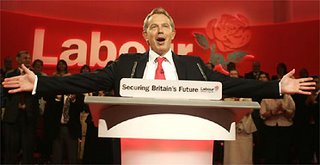 And so it is done. Tony Blair has made his last party conference speech as Labour leader and Prime Minister, and British politics will never be quite the same again.
And so it is done. Tony Blair has made his last party conference speech as Labour leader and Prime Minister, and British politics will never be quite the same again.Watching the speech via the BBC website rather than live in the conference hall as of old, it was clear to me that he has his eyes on one last great historical achievement before he hands over, working to resolve the Middle East conflict that is the fulcrum of so many of the world's problems.
"I will dedicate myself with the same commitment I have given in Northern Ireland to advancing peace between Israel and Palestine," he said.
If he can achieve that, I will gladly take back everything I have ever said about him.
But Mr Blair also made clear his intention to try to heal the wounds closer to home, pledging to work to unify the party in pursuit of "the only legacy that matters" - a fourth-term general election win.
And in that context, though they stopped short of an endorsement, his words about Gordon Brown this afternoon must surely be seen as an attempt to end the "deep fissure" in the New Labour family about which Peter Mandelson spoke this morning.
Mandelson's words seemed to me to signal a rapprochement and Blair's tribute to Brown's "remarkable service to the country" has underlined that.
Are the Blairites finally getting the message that by attacking Gordon, they only help David Cameron's Tories in the longer-run? Let's hope so.
Either way, this speech surely laid to rest any scurrillous suggestions that Blair sees Cameron as his real political heir, and is content to adopt an "apres moi le deluge" approach to the Labour Party.
The attacks on Cameron were the most convincing - and most loudly applauded - bits of the speech, mocking his foreign policy for simultaneously flirting with both anti-Americanism and Euro-scepticism.
"If we can't take this lot apart in the next few years, we shouldn't be in the business of politics at all," he said.
I may hate the bugger for what he did in Iraq, for what his henchmen did to David Kelly, and for all the years of media-manipulation and spin. But you can't help but admire a winner.

